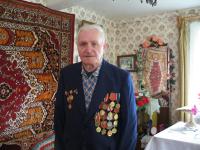After the war, there was no order
Born 28 January 1926 in Łunie near Słobódka in the Braslaw area. His parents had a five-hectare farm. Before World War II Władysław Karol completed six forms of a Polish school, after the war he attended a night school. After the second entry of the Soviets - in 1944 - he was called up and deported to Russia. He got to the Polish Second Army. He took part in the crossing of the Nysa river. The end of the war found him in Prague. For more than a year he fought against the UPA Ukrainians, near Sieniawa and Malawa. Then, he learned in Kraków to be a car driver. After he completed his military service in 1947 he came back to his homeland. In 1948, he was sent to work at clearing the forest in Karelia. From 1949 on he worked in a kolkhoz first as a foreman and then as a bookkeeper. He was also a mechanic at a potato drying house and a driver. For ten years he worked at the school in Słobódka as a work teacher, then, as a disinfector at a psychiatric hospital. He married in 1952 and had a church wedding in Latvia. Now, he lives in Słobódka

